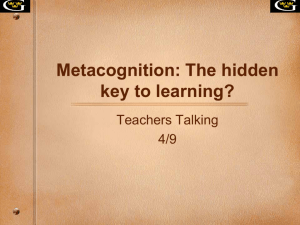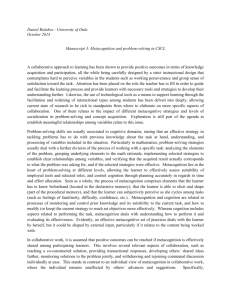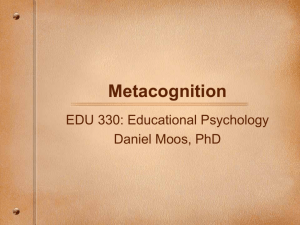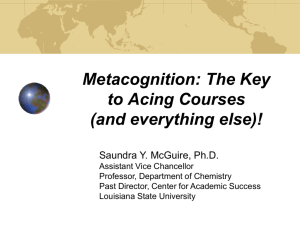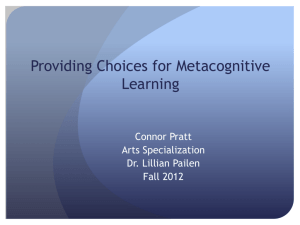T
advertisement
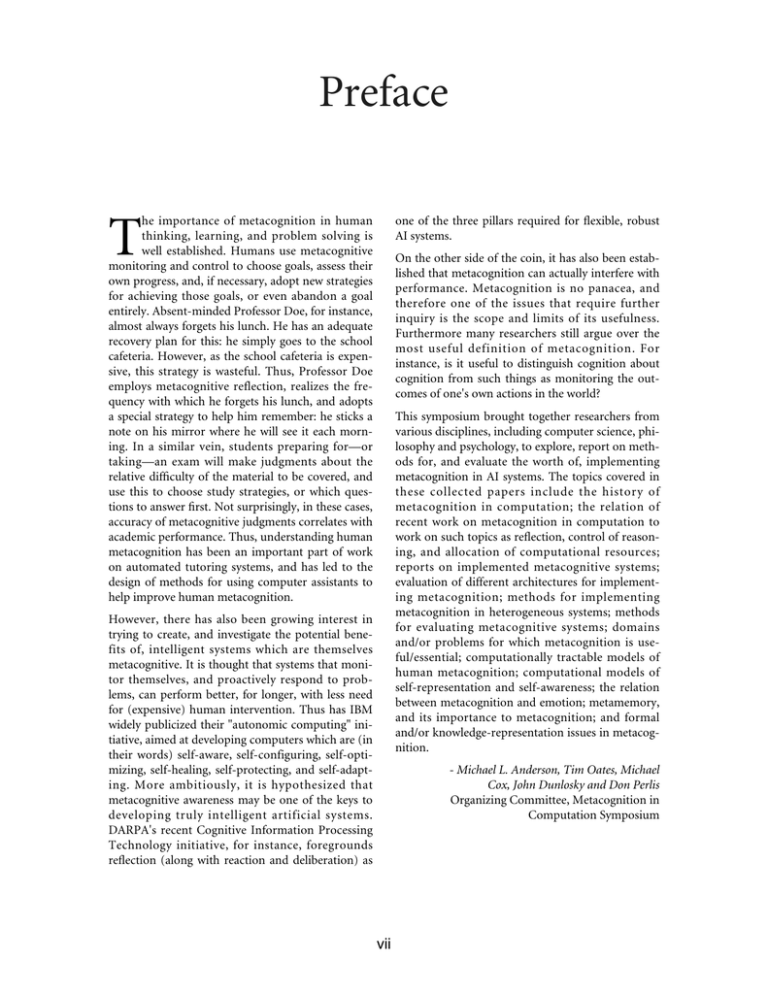
Preface he importance of metacognition in human thinking, learning, and problem solving is well established. Humans use metacognitive monitoring and control to choose goals, assess their own progress, and, if necessary, adopt new strategies for achieving those goals, or even abandon a goal entirely. Absent-minded Professor Doe, for instance, almost always forgets his lunch. He has an adequate recovery plan for this: he simply goes to the school cafeteria. However, as the school cafeteria is expensive, this strategy is wasteful. Thus, Professor Doe employs metacognitive reflection, realizes the frequency with which he forgets his lunch, and adopts a special strategy to help him remember: he sticks a note on his mirror where he will see it each morning. In a similar vein, students preparing for—or taking—an exam will make judgments about the relative difficulty of the material to be covered, and use this to choose study strategies, or which questions to answer first. Not surprisingly, in these cases, accuracy of metacognitive judgments correlates with academic performance. Thus, understanding human metacognition has been an important part of work on automated tutoring systems, and has led to the design of methods for using computer assistants to help improve human metacognition. one of the three pillars required for flexible, robust AI systems. T On the other side of the coin, it has also been established that metacognition can actually interfere with performance. Metacognition is no panacea, and therefore one of the issues that require further inquiry is the scope and limits of its usefulness. Furthermore many researchers still argue over the most useful definition of metacognition. For instance, is it useful to distinguish cognition about cognition from such things as monitoring the outcomes of one's own actions in the world? This symposium brought together researchers from various disciplines, including computer science, philosophy and psychology, to explore, report on methods for, and evaluate the worth of, implementing metacognition in AI systems. The topics covered in these collected papers include the history of metacognition in computation; the relation of recent work on metacognition in computation to work on such topics as reflection, control of reasoning, and allocation of computational resources; reports on implemented metacognitive systems; evaluation of different architectures for implementing metacognition; methods for implementing metacognition in heterogeneous systems; methods for evaluating metacognitive systems; domains and/or problems for which metacognition is useful/essential; computationally tractable models of human metacognition; computational models of self-representation and self-awareness; the relation between metacognition and emotion; metamemory, and its importance to metacognition; and formal and/or knowledge-representation issues in metacognition. However, there has also been growing interest in trying to create, and investigate the potential benefits of, intelligent systems which are themselves metacognitive. It is thought that systems that monitor themselves, and proactively respond to problems, can perform better, for longer, with less need for (expensive) human intervention. Thus has IBM widely publicized their "autonomic computing" initiative, aimed at developing computers which are (in their words) self-aware, self-configuring, self-optimizing, self-healing, self-protecting, and self-adapting. More ambitiously, it is hypothesized that metacognitive awareness may be one of the keys to developing truly intelligent artificial systems. DARPA's recent Cognitive Information Processing Technology initiative, for instance, foregrounds reflection (along with reaction and deliberation) as - Michael L. Anderson, Tim Oates, Michael Cox, John Dunlosky and Don Perlis Organizing Committee, Metacognition in Computation Symposium vii

